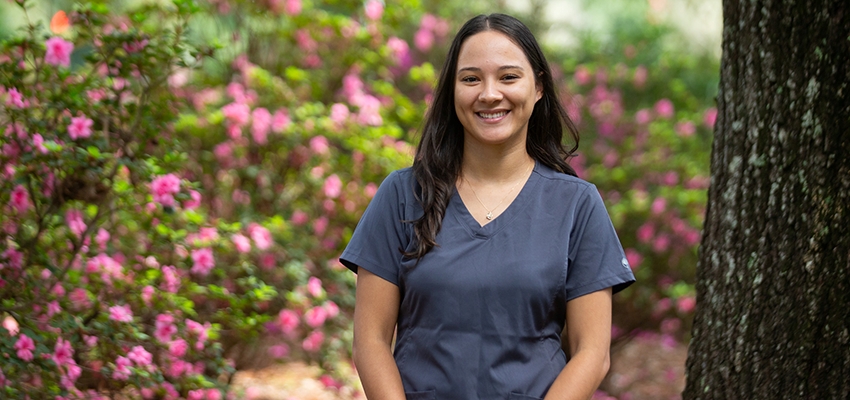A Bridge of Communication
Posted on October 29, 2024 by CAHP

While growing up in Connecticut, Caitlin Hebert realized that she had a passion for communication disorders and language. After graduating with her bachelor’s in communication disorders, the COVID-19 pandemic changed her course of action to go into a doctoral program. Hebert instead began working as an interpreter in schools for children who are deaf. After this, she realized that working with children is where her heart lies.
Hebert later made the decision to come to the University of South Alabama after a tour of campus and meeting with Dr. Elizabeth Adams, associate dean for graduate affairs, to learn what the Doctor of Audiology program had to offer. After moving to Pensacola with her husband, Hebert began making the commute to Mobile in order to attend classes. Recently, she moved to Mobile after her husband was stationed in California.
“When I first came here, I had never been to Alabama and had never even really been to the South that much. When I was accepted, I asked if I could do a tour of the school because I was terrified about what it was going to be like, and Dr. Adams was the first person I met here. She made me feel comfortable!” Hebert said.
Hebert’s interest in working with children grew when she came to the realization that not many families that have deaf children know how to communicate with them. The mixture of the medical and advocacy components that the audiology program at South has to offer became a defining factor in why she strives to provide easier communication methods for these children and their families.
“It’s unfortunate because it’s not like they don’t want their children to succeed. It’s just that they’re not educated in all of these things. They’re getting told different things from the audiologists and Deaf communities, and I think that is where I can be a bridge to connect these two worlds,” Hebert said.
While at South, Hebert has found a home away from home with her peers and with the Deaf community in Mobile. This is something that she believes is crucial when it comes to learning and understanding local signs as well as building your own sense of community.
When Hebert is not studying or spending time with her yorkie, Thor, she works as an American Sign Language educational interpreter through an agency, Connect ASL, and works part-time through different online learning websites teaching ASL. Through this, Hebert finds that it opens up a new line of communication for those that are actively reaching out to learn more about ASL.
“The immersion is what gets you stuck. You make a friend; you want to communicate with them and now you’ve got to learn more signs. Once you know one deaf person, you get into the community easier. Reaching out and telling them that you want to be involved is the easiest start!” Hebert said.
If Hebert could offer any advice to those who would want to learn more about ASL, she would recommend reaching out to your Deaf community and social groups. Hebert advises learning even the smallest amount on your own, like the alphabet or how to say your name, and then going out and being able to practice that with others like you would any language. Being able to see progress in not only her own students, but in the community as well, are two key factors that help validate and encourage Hebert to continue on her journey.
On top of learning how to communicate with others effectively, Hebert has also been able to take on more opportunities based on her knowledge of ASL. From helping families to being an official performing arts interpreter at a concert in Pensacola, her experience has helped many people enjoy their lives to the fullest.
After graduation, Hebert dreams of working at a school for the deaf. After shadowing in undergrad at the American School for the Deaf in her hometown of Connecticut, she would love to be able to go back and work there full time.
“When I’m in the schools with children, a lot of them don’t get language until too late, and it ends up messing up a lot of stuff. I’ve always known I wanted to work with kids as well, so that plus the language tied together. Then, I learned sign language, and all of these things started connecting with the experience I have now,” Hebert said. “Being able to watch the kids from the fall to the spring change and learn how to communicate better and hearing stories from the parents have been my motivating factors.”
Where is your favorite place to study on campus?
“The second floor of the Marx library. I prefer studying by myself and in a group
setting, I’ve had times where we do individual exams and I’d probably just study by
myself then. But, every year we have composition exams, so when those come up we all
are in the library getting a room and using the whiteboard to bounce ideas off of
each other and sharing notes.”
Would you say you have any mentors within the program?
Dr. Davis, we have her all first year every semester and she has had me at my good
and my bad. I go to her constantly just to stand in her doorway, and she asks me ‘What’s
going on?’”
What mantra/motto inspires you each day?
“My husband and I say this all the time, but it’s ‘set yourself up for success.’ When
I don’t study and then don’t do well on a test, he reminds me of it.”


